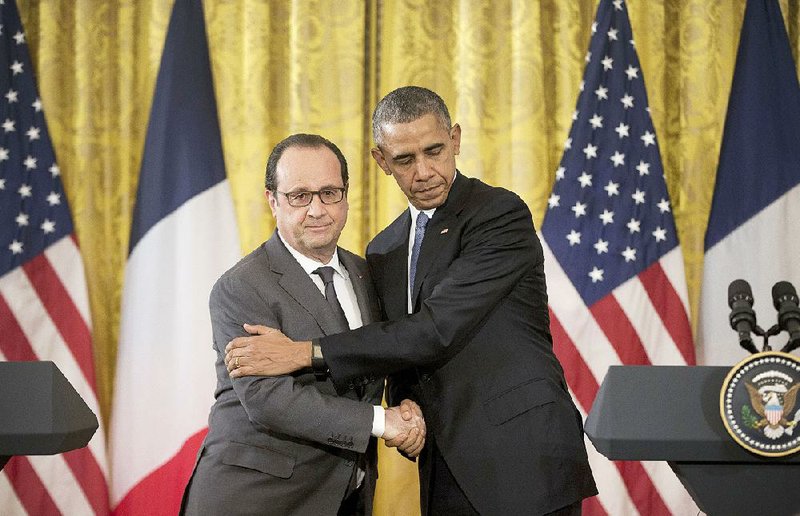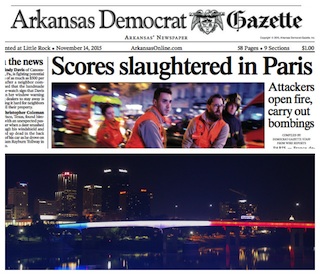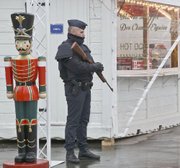WASHINGTON -- President Barack Obama and French President Francois Hollande vowed Tuesday to escalate airstrikes against the Islamic State and bolster intelligence sharing after the deadly attacks in Paris.
RELATED ARTICLES
http://www.arkansas…">Hill: U.S. needs broad strategy to fight ISIS http://www.arkansas…">Turks down Russian jet; 1 pilot killed
They also called on Russia to join the international efforts, but only if Moscow ends its support for Syrian President Bashar Assad.
"Russia is the outlier," Obama said during a joint White House news conference with Hollande.
Tuesday's meeting came hours after Turkey shot down a Russian warplane near the Syrian border.
Obama said Russian cooperation in the fight against the Islamic State would be "enormously helpful." But he insisted a partnership is impossible as long as Russia stands by Assad, who is blamed by the U.S. for creating the vacuum that allowed the Islamic State to strengthen.
"We hope that they refocus their attention on what is the most substantial threat and that they serve as a constructive partner," Obama said of Russia.
Hollande concurred, saying France wants to work alongside Russia, but only if President Vladimir Putin "fully commits" to supporting a political transition in Syria.
Hollande's alignment with Obama was notable, given he was expected to urge the U.S. president to put aside some of his differences with Russia to build a new coalition to fight the extremists. But Hollande's mission quickly became entangled with the fallout from the downed Russian military plane.
Obama cautioned that information about the plane still was emerging. However, he did say that Turkey had a "right to defend its territory and its airspace."
The White House is deeply skeptical of Putin's motivations, given his longstanding support for Assad, and it has accused Putin of bombing rebels fighting the Syrian leader instead of targeting the Islamic State.
Hollande will meet with Putin on Thursday in Russia, part of his diplomatic effort to build support for an intensified campaign against the Islamic State. The terror group is blamed for the Nov. 13 attacks in Paris that killed 130 people and wounded hundreds more at restaurants, a concert venue and outside a soccer stadium.
The attacks in the heart of Europe sparked fears of terrorism in the U.S., as well as an outpouring of solidarity with the French. Obama spoke of America's affection for France, noting that he keeps a photograph by his bed of his wife, Michelle, and him kissing in the city's Luxembourg Gardens.
Hollande welcomed the U.S. show of unity but suggested he was more interested in actions than kind words.
"The Paris attacks generated a lot of emotions," he said through an interpreter. "But that's not enough. We must act."
Obama and Hollande pledged to increase airstrikes against extremist targets, take back Islamic State-controlled territory in Iraq and Syria, and focus more on disrupting the terrorists' financial networks. Hollande identified Islamic State supply lines and command centers as top targets.
However, Hollande joined Obama in refusing to intervene militarily on the ground in Iraq and Syria, saying that is a role for local forces.
Shortly after their meeting, a French official in Washington said French warplanes had struck an Islamic State command center west of the Iraqi city of Mosul.
The U.S. has deployed more than 3,000 troops to Iraq to train and assist security forces there. Efforts to train and equip moderate rebel groups in Syria have struggled, and Obama has authorized the deployment of 50 special operations forces to jump-start the program.
While Obama has repeatedly heralded a coalition of more than 60 countries fighting the Islamic State, the U.S. is undertaking the bulk of the direct military action. Obama suggested the Paris attacks had prompted "new openness" among coalition members to step up their involvement, although he did not outline any specific commitments.
The military planning comes amid a parallel diplomatic effort to ease Assad from office. Russia has agreed in principle to a new process that would lead to United Nations-supervised elections within 18 months but continues to oppose efforts to explicitly remove Assad.
Hollande said he wouldn't set a deadline for Assad leaving office because "it must be as soon as possible."
Obama suggested the solution hinged on Assad "choosing not to run" in the next Syrian elections.
Syria's civil war, now in its fifth year, has left more than 250,000 people dead and has displaced millions, sparking a refugee crisis in Europe.
The Paris attacks have raised fears in Europe and the U.S. that terrorists might try to sneak into the West as part of the refugee flow. In Washington, the House has passed legislation tightening vetting for refugees from Syria and Iraq, although the White House contends the additional restrictions would effectively block people from those countries from coming to the U.S.
Hollande has said France will press forward with its plans to accept 30,000 Syrian refugees. But he acknowledged Tuesday that there was a need to tighten Europe's open borders.
"I reject identifying migration and terrorism," Hollande said. "At the same time, we must control the border."
Obama praised France's decision to accept tens of thousands of Syrians fleeing warfare and the Islamic State.
Besides Thursday's meeting with Putin, Hollande also will visit with leaders from Germany and Italy this week.
In Paris on Tuesday, the city's prosecutor said the man believed to have planned the Nov. 13 attacks likely had planned to carry out another suicide bombing days later in the French capital's business district.
Abdelhamid Abaaoud and an accomplice are believed to have been planning to attack La Defense on Nov. 18 or 19, Paris prosecutor Francois Molins said.
Abaaoud was among three people killed during a police raid on an apartment in a northern Paris suburb in the early hours of Nov. 18. His cousin, Hasna Ait Boulahcen, died of asphyxia, apparently from the explosive-laden vest detonated by a third person, who hasn't been identified, the prosecutor said. The explosion led to part of the apartment collapsing.
Molins said the unidentified third person is believed to have been the accomplice with whom Abaaoud would have carried out an attack on La Defense, the high-rise district that is headquarters to major companies on the western edge of Paris.
The prosecutor said he "can't be and doesn't want to be more precise" on the details suggesting such an attack had been planned. Information obtained Thursday suggested "that the two attackers -- Abaaoud and the man we found by his side in the apartment -- were planning an attack consisting of blowing themselves up at La Defense either on Wednesday the 18th or Thursday the 19th," Molins said.
On Tuesday, a judge also handed down terrorism-related charges against Jawad Bendaoud, the only person so far in France known to be facing such charges directly linked to the Nov. 13 attacks. He was charged with criminal association and detention of incendiary or explosive substances linked to a terrorist enterprise.
Bendaoud in a television interview acknowledged giving shelter to two people from Belgium in his home in Saint-Denis but said he didn't know who they were. The prosecutor disputed that and said Bendaoud's suspected links with the attackers were being investigated.
Information for this article was contributed by Julie Pace, Kathleen Hennessey, Cara Anna, Samuel Petrequin, Nicolas Vaux-Montagny, Raf Casert, Elena Becatoros, Elaine Ganley, Lori Hinnant of The Associated Press and by Juliet Eilperin and Karen DeYoung of The New York Times.
A Section on 11/25/2015



